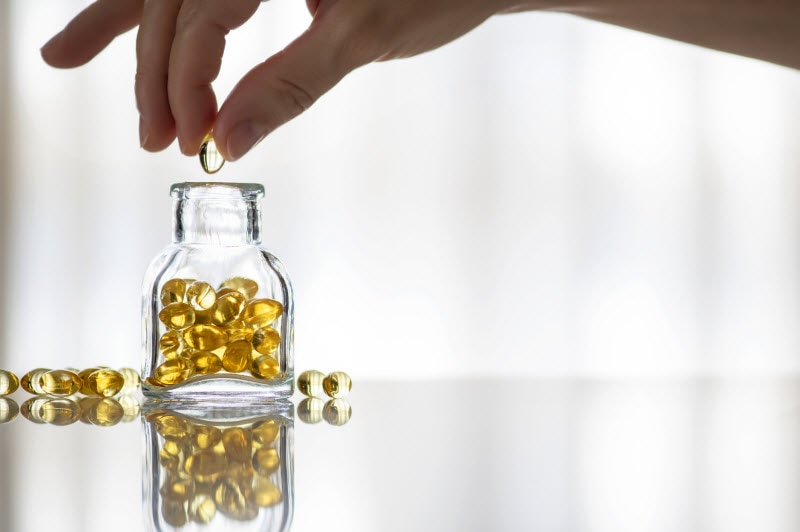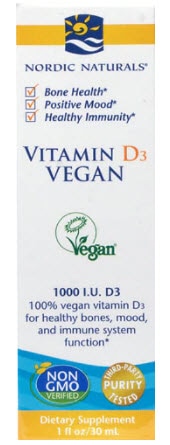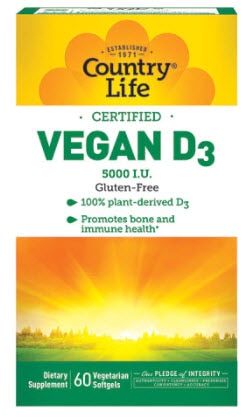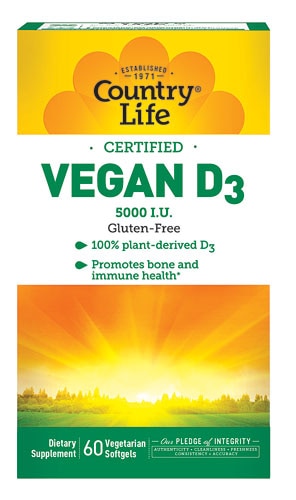To follow a strict vegan diet, you have to know the source of the ingredients in the food you eat, as well as the supplements you take. That includes vitamin D supplements, which are commonly sourced from animal products.
Fortunately,
vegan vitamin D supplements are also available. The number of options has increased over the past several years as interest in plant-based eating has grown.

Where does vitamin D come from?
Your body can make vitamin D when you expose your skin to ultraviolet-B (UV-B) light from the sun. But that is
very limited in the winter months. Moreover, people who work indoors have limited sun exposure year-round. There aren’t many food sources of vitamin D either. So, many of us rely on dietary supplements to get a significant portion of our vitamin D.
Much of the vitamin D used in dietary supplements and fortified foods isn’t vegan because it comes from sheep
lanolin, an oil in the animals’ wool. Other supplements get the vitamin D from fish oil, such as
cod liver oil.
The vitamin D in animal-sourced supplements is in the form of D3 (cholecalciferol). That is the same type produced in your skin from sun exposure. Until recently, the main form of vegan vitamin D supplement was D2 (ergocalciferol). That usually comes from algae or mushrooms.
Though D2 has been used successfully to help vegans maintain adequate vitamin D levels,
some research suggests it isn’t as potent as D3. One study in healthy adults found that D3 was
87% more potent for raising and maintaining blood levels of vitamin D. The same study found that D3 promoted two- to three-fold more storage of the vitamin in the body compared to D2.
Fortunately, vegans and vegetarians who prefer the D3 form can now buy vegan vitamin D3. This typically comes from
algae or
lichen. Lichen looks similar to moss and is a symbiotic combination of fungi and algae, which function together interdependently. These organisms produce D3 when exposed to ultraviolet light.
Plant sources of vitamin D beyond supplements
Plant-based food sources of vitamin D are even more limited than animal sources, which are primarily
fish, liver, egg yolks and fortified milk. The main vegan-friendly food that provides vitamin D is mushrooms. They contain ergosterol, which can be converted to vitamin D when exposed to ultraviolet light.
That said, many commercially-grown mushrooms are
grown indoors, so they often aren’t a good source of vitamin D. On the other hand, at least one major brand of mushrooms is purposely exposed to ultraviolet light to boost the vitamin D content. If that’s the case, you’ll likely see the mushrooms labeled as high in vitamin D.
Here’s a
comparison of the typical vitamin D content of 1 cup of mushrooms, though amounts will vary with the brand and source:
- Brown or crimini mushrooms: 2 International Units (IU)
- White or portabella mushrooms: 3–9 IU
- Chanterelle mushrooms: 114 IU
- Morel mushrooms: 136 IU
- Mushrooms commercially exposed to UV light: 384 IU

The type of vitamin D produced by mushrooms is primarily D2. However,
some research has shown that mushrooms can also produce D3 when exposed to ultraviolet rays.
Some vegan fortified foods, such as many
plant-based milk alternatives, are fortified with vitamin D. You can check the
Nutrition Facts panel for the amount, which is commonly listed in micrograms (mcg). To convert mcg to International Units, multiply by 40 since
40 IU vitamin D = 1 mcg.
If a fortified packaged food isn’t marked “vegan,” check the type of vitamin D that has been added. If it’s D2 (ergocalciferol), you’ll know it’s vegan. But if it is D3 (cholecalciferol), the vitamin D is likely animal-sourced. For example, though some orange juice is fortified with vitamin D, it is typically from animal products.
It is anticipated that food manufacturers will develop new vegan sources of vitamin D-fortified foods in the future. In July 2020, the
FDA approved the use of
vitamin D2 mushroom powder to be added to certain foods, including cereal, baked goods, juices and meal replacements.
Risk of vitamin D deficiency in vegans and vegetarians
People following a vegan diet are more likely to be low in vitamin D,
particularly if they don’t supplement with the nutrient. Taking a vitamin D supplement is a simple remedy for this problem and could help you avoid the consequences of vitamin D shortfalls.
†
In a
recent observational study of 34,542 adults ages 45 and older, vegan women who didn’t take vitamin D and calcium supplements had almost three times the risk of breaking a hip, compared to meat-eaters.
† On the other hand, vegans taking both vitamin D and calcium were at no greater risk of a hip fracture than meat-eaters.
†
Children who follow vegan or vegetarian diets are also at increased risk of vitamin D deficiency. Their nutrient and energy needs are higher relative to their body weight. So, it can be especially tricky for them to get enough vitamin D.
†
In a
study of Polish children ages 5–10, those who were vegetarian or vegan and not taking a supplement were at significantly increased risk of low vitamin D levels, compared to those who ate animal products. The vegan children also had lower mineral stores in their bones.
†
Vitamin D plays a key role in bone health by promoting calcium absorption and the normal mineralization of bones. Calcium absorption is reduced by
about 65% if you are deficient in vitamin D.
†
On top of its bone benefits, vitamin D also plays an important role in
proper immune function.
†
Tips for buying and using vegan vitamin D supplements
“Vegan” is an important selling point on vitamin D supplements, so most likely if a vitamin D supplement is vegan, it will say so on the label. If you want to know the specific source of the vitamin D and whether it is D2 or D3, check the fine print on the label or the company’s website. If the source isn’t mentioned, contact the manufacturer and ask.
In some cases, lichen (vegan D3) may be listed by its scientific name on the product label. There are many different species of lichen. For example, some vegan D3 supplements may list
Cladonia rangiferina, a species also known as reindeer lichen.

A decision everyone faces when choosing a vitamin D supplement is the dosage. Historically, the amounts of vitamin D recommended were to prevent bone health issues related to deficiency of the nutrient. However, much debate continues as to how much vitamin D we need to help our body function
optimally.
†
According to the Endocrine Society, the
daily requirement of vitamin D for adults at risk of vitamin D deficiency is 1,500–2,000 IU. People who are already deficient may need more of the nutrient. The upper limit of safe daily intake for adults is 10,000 IU.
Ultimately, the best way to determine if you’re getting enough vitamin D is to ask your doctor to test your blood level. It should be at least 30 ng/mL.
Some experts recommend keeping your vitamin D level at 40–60 ng/mL to attain the overall health benefits of the nutrient. If you’re not reaching your target with vegan D2 supplements, consider trying a vegan D3 supplement.
†
Lastly, note that to maximize the benefits of vitamin D, you need adequate magnesium.
Around half of people don’t get enough of this mineral in their diet, though
vegans tend do better getting magnesium than meat-eaters.
Magnesium plays an important role in the activation and transport of vitamin D in your body.
Some people may need to supplement with both nutrients to adequately raise their blood level of vitamin D.
†
†These statements have not been approved by the Food and Drug Administration. These products are not intended to diagnose, treat, cure or prevent disease.
 The type of vitamin D produced by mushrooms is primarily D2. However, some research has shown that mushrooms can also produce D3 when exposed to ultraviolet rays.
Some vegan fortified foods, such as many plant-based milk alternatives, are fortified with vitamin D. You can check the Nutrition Facts panel for the amount, which is commonly listed in micrograms (mcg). To convert mcg to International Units, multiply by 40 since 40 IU vitamin D = 1 mcg.
If a fortified packaged food isn’t marked “vegan,” check the type of vitamin D that has been added. If it’s D2 (ergocalciferol), you’ll know it’s vegan. But if it is D3 (cholecalciferol), the vitamin D is likely animal-sourced. For example, though some orange juice is fortified with vitamin D, it is typically from animal products.
It is anticipated that food manufacturers will develop new vegan sources of vitamin D-fortified foods in the future. In July 2020, the FDA approved the use of vitamin D2 mushroom powder to be added to certain foods, including cereal, baked goods, juices and meal replacements.
The type of vitamin D produced by mushrooms is primarily D2. However, some research has shown that mushrooms can also produce D3 when exposed to ultraviolet rays.
Some vegan fortified foods, such as many plant-based milk alternatives, are fortified with vitamin D. You can check the Nutrition Facts panel for the amount, which is commonly listed in micrograms (mcg). To convert mcg to International Units, multiply by 40 since 40 IU vitamin D = 1 mcg.
If a fortified packaged food isn’t marked “vegan,” check the type of vitamin D that has been added. If it’s D2 (ergocalciferol), you’ll know it’s vegan. But if it is D3 (cholecalciferol), the vitamin D is likely animal-sourced. For example, though some orange juice is fortified with vitamin D, it is typically from animal products.
It is anticipated that food manufacturers will develop new vegan sources of vitamin D-fortified foods in the future. In July 2020, the FDA approved the use of vitamin D2 mushroom powder to be added to certain foods, including cereal, baked goods, juices and meal replacements.
 A decision everyone faces when choosing a vitamin D supplement is the dosage. Historically, the amounts of vitamin D recommended were to prevent bone health issues related to deficiency of the nutrient. However, much debate continues as to how much vitamin D we need to help our body function optimally.†
According to the Endocrine Society, the daily requirement of vitamin D for adults at risk of vitamin D deficiency is 1,500–2,000 IU. People who are already deficient may need more of the nutrient. The upper limit of safe daily intake for adults is 10,000 IU.
Ultimately, the best way to determine if you’re getting enough vitamin D is to ask your doctor to test your blood level. It should be at least 30 ng/mL. Some experts recommend keeping your vitamin D level at 40–60 ng/mL to attain the overall health benefits of the nutrient. If you’re not reaching your target with vegan D2 supplements, consider trying a vegan D3 supplement.†
Lastly, note that to maximize the benefits of vitamin D, you need adequate magnesium. Around half of people don’t get enough of this mineral in their diet, though vegans tend do better getting magnesium than meat-eaters. Magnesium plays an important role in the activation and transport of vitamin D in your body. Some people may need to supplement with both nutrients to adequately raise their blood level of vitamin D.†
†These statements have not been approved by the Food and Drug Administration. These products are not intended to diagnose, treat, cure or prevent disease.
A decision everyone faces when choosing a vitamin D supplement is the dosage. Historically, the amounts of vitamin D recommended were to prevent bone health issues related to deficiency of the nutrient. However, much debate continues as to how much vitamin D we need to help our body function optimally.†
According to the Endocrine Society, the daily requirement of vitamin D for adults at risk of vitamin D deficiency is 1,500–2,000 IU. People who are already deficient may need more of the nutrient. The upper limit of safe daily intake for adults is 10,000 IU.
Ultimately, the best way to determine if you’re getting enough vitamin D is to ask your doctor to test your blood level. It should be at least 30 ng/mL. Some experts recommend keeping your vitamin D level at 40–60 ng/mL to attain the overall health benefits of the nutrient. If you’re not reaching your target with vegan D2 supplements, consider trying a vegan D3 supplement.†
Lastly, note that to maximize the benefits of vitamin D, you need adequate magnesium. Around half of people don’t get enough of this mineral in their diet, though vegans tend do better getting magnesium than meat-eaters. Magnesium plays an important role in the activation and transport of vitamin D in your body. Some people may need to supplement with both nutrients to adequately raise their blood level of vitamin D.†
†These statements have not been approved by the Food and Drug Administration. These products are not intended to diagnose, treat, cure or prevent disease.





